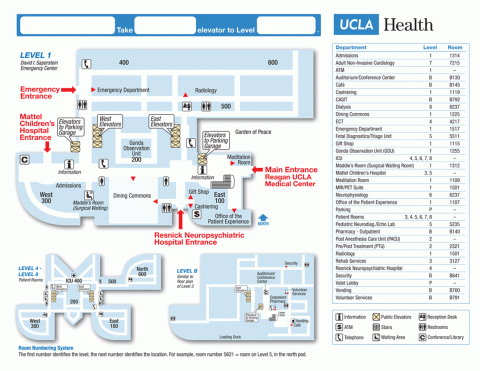After Your Child's Surgery

We want to reunite children with their parents as soon as possible after a surgery or procedure. We will contact you immediately after your child’s surgery and direct you where to go to see him/her.
After surgery, we will either take your child to the to recover or to an intensive care unit (ICU), depending on the type of surgery, the child’s age and any specific care needs. The surgical team now transfers your child’s care to the inpatient care team.
Visiting Your Child After Surgery
While in recovery, we will closely monitor your child as he/she wakes from anesthesia. For health and safety reasons, only two adults at a time can be with your child while in the PACU. Siblings under 18 will not be allowed to visit in the PACU, but may visit later if your child is admitted. Read the visitor guidelines for UCLA Mattel Children’s Hospital and Ronald Reagan UCLA Medical Center.
You may feel overwhelmed or frightened the first time you see your child after surgery. This is a very normal parent reaction. The surgical team will be there to help explain what is going on. Here are a few things to prepare you:
- Your child may be connected to one or several monitors. His/her face may seem puffy or swollen, and there may be tubes or IVs.
- If your child has a breathing tube in his/her mouth (doctors use this to keep your child breathing safely during and after surgery), he or she will not be able to speak or cry. Your child will regain his/her voice as soon as the tube is removed.
- Some children experience confusion or excitement as they wake from anesthesia. This reaction is called “emergence delirium.” It may be distressing to see your child crying or upset from emergence delirium, but it does not mean your child is in pain. Read more about emergence delirium and what you need to know about anesthesia.
- A nurse and a doctor will be assigned to your child to monitor and keep him/her safe and as comfortable as possible. This includes checking vital signs and giving additional pain medication as necessary.
Helping Your Child During Recovery
Most children feel some degree of discomfort when they wake from surgery, whether from pain or swelling around the incision, throat soreness from a breathing tube, or nausea.
You know your child best. Here is how you can help our surgical team and your child during the recovery period:
- Tell the PACU nurse what tends to soothe your child.
- Do not wake up your child if he/she is sleeping.
- Speak calmly and quietly, in ways your child will find reassuring.
- The PACU doctor will determine when it is safe for your child to start eating and drinking. We will start with clear liquids and popsicles and work toward a light snack such as crackers. Encourage your child to drink plenty of fluids once the surgical team gives the go-ahead.
Most parents are worried about their child experiencing pain after surgery. UCLA Mattel Children’s Hospital is continually improving the way we think about and manage pain in children. Parents are our most important partners. Read about what our team does — and what you can do — to help manage your child’s pain.
Going Home After Surgery
After spending time in the PACU and depending on the type of surgery, your child will either be admitted to the hospital or go back to the pretreatment unit (PTU) to be discharged home. In the Ambulatory Surgery Centers, we will discharge your child directly from recovery once he/she is alert and stable.
Where your child goes after surgery depends on the specific type of procedure and whether your child’s medical condition needs further monitoring. Additionally, for safety precautions, if your child was born pre-term (before 37 weeks gestation) or if your child is currently younger than 2 months old, he/she may need to stay in the hospital up to 24 hours after the procedure. If you do not know whether or not your child will be admitted, consult with your child’s surgeon to find out.
If no admission is needed, the surgical team will assess and discharge your child when he/she:
- Has stable vital signs (blood pressure, pulse, temperature and breathing)
- Is able to drink some liquids without becoming nauseated or vomiting
- Is managing any pain and feels comfortable enough to go home
Before you leave, the surgical team will provide all the necessary follow-up care instructions, including any prescriptions needed for pain medication. A nurse will give you written instructions and review any home care. If it is not clear in the instructions, make sure to ask about:
- Medications and prescriptions
- Special instructions for changing wound dressings
- Activity restrictions, including school
- Bathing or shower restrictions
- Signs and symptoms of possible complications and who you should call if you notice them
- Follow-up appointments
Admission to UCLA Mattel Children’s Hospital After Surgery
If your child underwent a more extensive surgery or has an underlying medical condition, he/she may need to be admitted to the hospital to continue to recover. Your child’s surgeon will tell you ahead of time how long you can expect your child to stay in the hospital after surgery.
Read more about admissions at UCLA Mattel Children’s Hospital (including downloadable PDFs).
What to Read Next
Find out more about UCLA Mattel Children’s Hospital surgery locations, including directions and parking information, as well as complete contact information.
